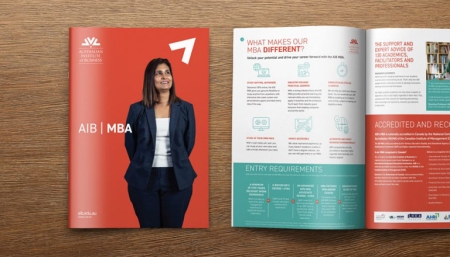Why every entrepreneur should have an MBA

The term ‘entrepreneur’ is one that we hear on a regular basis, but sometimes find it difficult to collectively define. Is an entrepreneur a small business owner? Are they someone who has taken great risks to be innovative in a commercial environment? According to Forbes, “Entrepreneurs, in the purest sense, are those who identify a need – any need – and fill it. It’s a primordial urge, independent of product, service, industry or market.”
Globally, the number of entrepreneurs is growing each day, with over two-thirds of adults worldwide indicating, “entrepreneurship is a good career choice”. However, all too often, we see passionate and driven entrepreneurs pursue their idea, without any formal training or understanding of how the business environment operates.
Many of the world’s top CEOs, who also consider themselves entrepreneurs, possess business qualifications such as the Master of Business Administration (MBA). Leading executives working for large corporations also tend to hold business degrees, but does this mean every entrepreneur or business owner needs a qualification to achieve success? While there are certainly success stories of entrepreneurs without formal education, there are several compelling reasons why an entrepreneur should have an MBA or similar.
MBA graduates develop a 360-degree view of business
A common pitfall experienced by entrepreneurs is that they have a great idea, but they don’t have the skills or knowledge to effectively execute it. Professor Maurits van Rooijen, Director and CEO of London School of Business and Finance, said that by character, an entrepreneur may not be a very good manager. “To successfully develop a business requires all-round knowledge and managerial skills: from understanding finance and marketing, to how to find, assess and develop talent, and interact effectively with your staff and clients,” he said.
Every entrepreneur should have an MBA as it teaches the 360-degree view of business, allowing you to immerse yourself into each area. MBAs learn how each business function operates with one another, which is valuable knowledge both in the establishment of a business and in key growth phases. It can also assist in creating a proper business plan, allowing entrepreneurs to set their business up for lasting and stable success.
Entrepreneurs are products of their environment
Successful entrepreneurs are synonymous with tenacity, grit, resilience and determination, all of which are important personality traits for success in business. These traits alone, however, are rarely enough for long-term success, as the individual needs to know how to effectively build and manage the business once the idea is implemented.
Professor Andrew Godly of Henley Business School’s Centre for Entrepreneurship argues that there is no significant evidence to suggest that there are specific personality traits associated with entrepreneurship. “Rather, all available evidence suggests that entrepreneurs are not born, but are in fact products of their environment, and what they have learned, whether through formal education or otherwise,” he said. A qualification such as the MBA goes hand-in-hand with existing personal qualities, building on them and complementing them to develop overall business capabilities.
Confidence and other soft skills are so valuable
Outside of the MBA curriculum, the qualification is also praised for benefits such as increased confidence, strategic thinking and greater organisational skills. If students commence the MBA lacking in those areas, they are certain to graduate with an improvement, simply due to the nature of course requirements, including assessments and deadlines. Students must be very strategic in their time management, juggling work commitments with business school demands on a daily basis. They also find that while they are already competent and confident individuals, the MBA provides opportunity to increase confidence in areas outside of their specialty.
For Mr Ted Cofie, AIB MBA Graduate and Founder and CEO at Nyaco Management, the MBA helped him pursue his entrepreneurial dreams thanks to increased confidence. He had always known that he wanted to start his own company, but there were parts of a company that he did not yet understand. “The MBA gave me confidence to go ahead and start it. It covered so many facets of a business that I’m now confident in implementing the ideas in my own business,” he said.
While confidence and time management are not subjects taught in an MBA, the experiences gained throughout the programme are what will be so valuable to entrepreneurs. Along with their holistic business knowledge, entrepreneurs with MBAs will find themselves able to approach difficult situations with confidence and a level head.
Open doors through network growth
Regardless of what industry you are in, building and maintaining relationships will be integral to your role. One of the most common benefits enjoyed by MBA graduates is the wealth of networking opportunities available to them, allowing them to establish a diverse, and often international, business network. For entrepreneurs, a solid network of contacts is invaluable.
Throughout the MBA, students interact with a range of people, from academics to business leaders and peers. Any one of these people could be a future investor, customer, advisor, business partner or employee. This benefit alone is enough to argue why every entrepreneur should have an MBA. When actively engaged in it, networking is the gift that keeps on giving, and the MBA opens a number of otherwise closed doors for entrepreneurs.
The bottom line is, entrepreneurs should have an MBA if they wish to possess fundamental business knowledge, foster key personality traits required, and finesse their skills. The market is only becoming more and more competitive, and entrepreneurs must continue to stay at the top of their game to succeed.
The following resources were used to compile this article: Global Entrepreneurship Monitor, Forbes and Management Today





